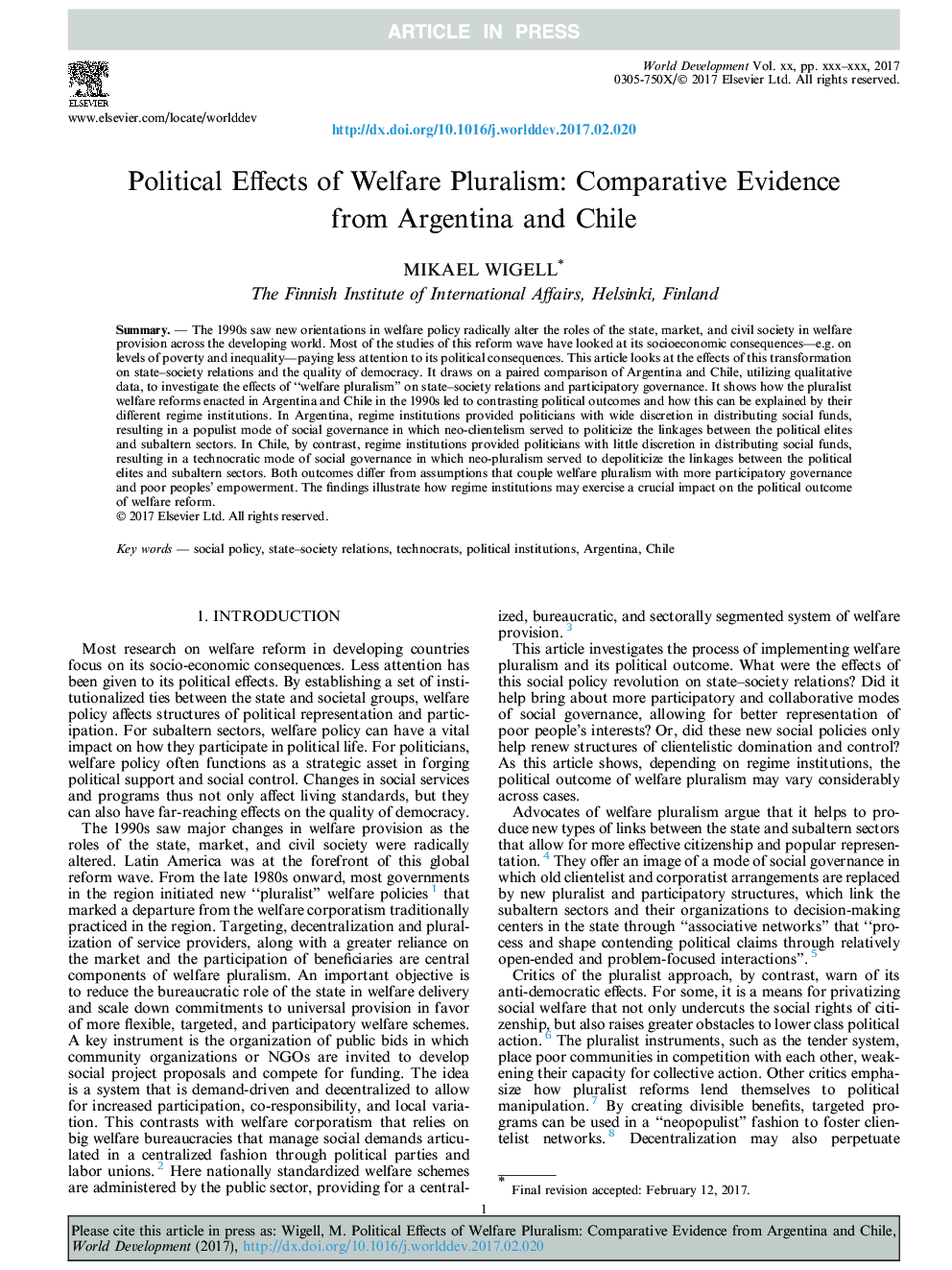| کد مقاله | کد نشریه | سال انتشار | مقاله انگلیسی | نسخه تمام متن |
|---|---|---|---|---|
| 5105266 | 1481123 | 2017 | 16 صفحه PDF | دانلود رایگان |
عنوان انگلیسی مقاله ISI
Political Effects of Welfare Pluralism: Comparative Evidence from Argentina and Chile
ترجمه فارسی عنوان
تأثیرات سیاسی تکثرگرایی رفاه: شواهد تطبیقی از آرژانتین و شیلی
دانلود مقاله + سفارش ترجمه
دانلود مقاله ISI انگلیسی
رایگان برای ایرانیان
کلمات کلیدی
سیاست اجتماعی، دولت روابط اجتماعی، تکنوکرات ها، نهادهای سیاسی، آرژانتین، شیلی،
ترجمه چکیده
دهه 1990، جهت گیری های جدید در سیاست های رفاه را، نقش های دولت، بازار و جامعه مدنی را در ایجاد رفاه در سراسر جهان در حال توسعه تغییر داد. اکثر مطالعات این موج اصلاحات، به بررسی پیامدهای اجتماعی و اقتصادی آنها پرداخته است. در سطوح فقر و نابرابری - توجه کمتر به پیامدهای سیاسی آن. این مقاله به بررسی تأثیرات این تحول در روابط دولت-جامعه و کیفیت دموکراسی می پردازد. این براساس مقایسه دوگانه آرژانتین و شیلی، با استفاده از داده های کیفی، برای بررسی اثرات پلورالیسم رفاه، ترسیم می شود؟ در روابط دولتی و حکومت مشارکتی. این نشان می دهد که اصلاحات رفاهی پلورالیستی که در دهه 1990 در آرژانتین و شیلی اجرا می شد، منجر به بروز مخالفت های سیاسی و چگونگی تأثیر آن توسط نهادهای مختلف رژیم می شد. در آرژانتین، مؤسسات رژیم، سیاستمدارانی را با اختیار گسترده در توزیع بودجه اجتماعی به وجود آوردند که منجر به شیوه پوپولیستی حکومت اجتماعی شد که در آن نیکی گرایی به سیاستزدن ارتباط میان نخبگان سیاسی و بخش های ساحلی کمک می کرد. در مقابل، در شیلی، مؤسسات رژیم، سیاستمداران را با کمترین اختیار در توزیع بودجه اجتماعی به وجود آوردند، که منجر به یک روش تکنوکراتیک از حکومت اجتماعی شد که در آن نئوپلرالیزم، وابستگی میان نخبگان سیاسی و بخشهای دوجانبه را از بین برد. هر دو نتیجه از پیش فرض هایی است که پلورالیسم رفاه را با حکومت مشارکتی بیشتر و توانمند سازی فقیران متمایز می کند. یافته ها نشان می دهد که چگونه موسسات رژیم می توانند تاثیرات اساسی بر نتایج سیاسی اصلاحات رفاهی داشته باشند.
موضوعات مرتبط
علوم انسانی و اجتماعی
اقتصاد، اقتصادسنجی و امور مالی
اقتصاد و اقتصادسنجی
چکیده انگلیسی
The 1990s saw new orientations in welfare policy radically alter the roles of the state, market, and civil society in welfare provision across the developing world. Most of the studies of this reform wave have looked at its socioeconomic consequences-e.g. on levels of poverty and inequality-paying less attention to its political consequences. This article looks at the effects of this transformation on state-society relations and the quality of democracy. It draws on a paired comparison of Argentina and Chile, utilizing qualitative data, to investigate the effects of “welfare pluralism” on state-society relations and participatory governance. It shows how the pluralist welfare reforms enacted in Argentina and Chile in the 1990s led to contrasting political outcomes and how this can be explained by their different regime institutions. In Argentina, regime institutions provided politicians with wide discretion in distributing social funds, resulting in a populist mode of social governance in which neo-clientelism served to politicize the linkages between the political elites and subaltern sectors. In Chile, by contrast, regime institutions provided politicians with little discretion in distributing social funds, resulting in a technocratic mode of social governance in which neo-pluralism served to depoliticize the linkages between the political elites and subaltern sectors. Both outcomes differ from assumptions that couple welfare pluralism with more participatory governance and poor peoples' empowerment. The findings illustrate how regime institutions may exercise a crucial impact on the political outcome of welfare reform.
ناشر
Database: Elsevier - ScienceDirect (ساینس دایرکت)
Journal: World Development - Volume 95, July 2017, Pages 27-42
Journal: World Development - Volume 95, July 2017, Pages 27-42
نویسندگان
Mikael Wigell,
